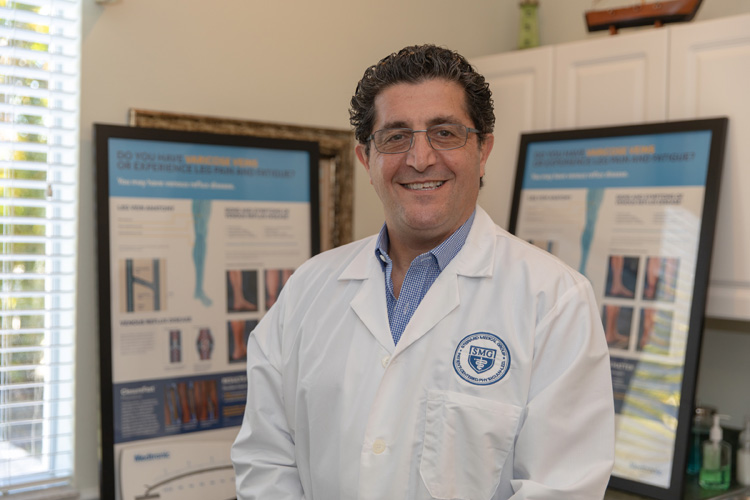
According to the Cleveland Clinic, an estimated 40 percent of people in the United States have a condition called “chronic venous insufficiency,” or CVI.
You don’t need a copy of “The Anatomical Basis of Clinical Practice” (also known as “Gray’s Anatomy”) to understand this particular problem.
What you do need to know is that some of your veins have valves.
Dr. Hadi Shalhoub of the Steward Medical Group, Advanced Surgical Associates and the Sebastian River Medical Center says that CVI occurs when those valves stop functioning properly.
High school anatomy likely taught you that your arteries send freshly oxygenated blood from your heart to nourish all your internal and external tissue and organs while your veins return that same blood back to the heart to start the cycle again.
Some veins, including those in your legs, are equipped with one-way valves that keep the blood flowing upwards to the heart.
If those valves fail, blood can flow backwards and pool in your lower extremities, which can result in pain, inflammation, internal tissue damage, open sores on the skin surface, cellulitis, varicose veins, high blood pressure, ulcers, deep vein thrombosis and even potentially lethal blood clots.
“People have to realize,” Shalhoub says, “this is not a cosmetic issue. It’s a real medical problem.”
One of the primary causes of vein valve failure can’t really be treated. It’s age. CVI most frequently occurs in people over 50.
But the condition itself can be treated. Vascular surgeons like Shalhoub have one more way to deal with this problem right in the office, no hospital required, including one relatively new way.
The first line of treatment, according to Shalhoub, is an old one: compression stockings. Designed to apply pressure to your lower legs, they can help maintain blood flow while reducing discomfort and swelling.
Beyond the stockings, laser treatments and radio frequency-generated heat can be effective treatments that “ablate” or damage the interior walls of the defective vein, which causes it to close. The body then absorbs the vein tissue and reroutes the blood through a different vein.
The newer treatment employs a product from Medtronics called VenaSeal.
Shalhoub says, for him, radio frequency ablation is “still the preferred way,” to treat chronic venous insufficiency, but he is quick to point out that the VenaSeal approach does offer some advantages.
VenaSeal is basically vein glue, a medical-grade adhesive that is injected into the vein with the damaged valves, effectively sealing it and stopping the blood flow so that the body redirects that flow to healthy veins.
“With heat ablation we can treat from the knee all the way to the groin but then we have to do a different type of ablation below that area,” Shalhoub says. “With VenaSeal, we can treat that whole length of that vein from the groin all the way to the ankles.”
He also notes that “the recovery is faster,” using VenaSeal, so people can get back to work or other activities sooner.
He estimates that 25 percent of his patients will end up being treated with VenaSeal for one reason or another, but is quick to point out that deciding in advance what treatment to use is an exercise in futility.
Every patient, he says, has to have “a full clinical evaluation” to find out whether there are other abnormalities to their vein structure. Sometimes the heart has to be evaluated; if the pump is not working, that can cause backup pressure in the lower veins and swelling in the legs.
A key part of the evaluation is a highly-specialized form of ultra-sound called a “VNUS Grade Doppler” which, Shalhoub explains, “is designed to visualize all of these valves and grade them to see if they are incompetent.”
With one more “tool in the toolbox” in the form of VenaSeal, Shalhoub says he and his fellow vascular surgeons can customize the most effective individual treatment plan possible for those with CVI.
Dr. Hadi Shalhoub is with the Steward Medical Group, Advanced Surgical Associates and the Sebastian River Medical Center. His offices are at 13100 U.S. 1 in Sebastian. The phone number is 772-581-8900. n



